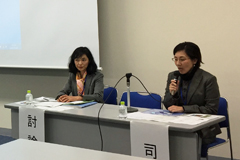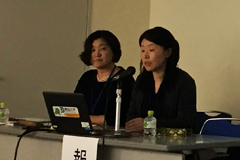Research Fellow Kawaguchi Speaks on Conflict and Gender-based Violence at the Annual Convention of the Japanese Association of International Relations
2018.11.28
The 2018 Annual Convention of the Japanese Association of International Relations was held between Nov. 2 and 4, 2018, at Sonic City in Omiya, Saitama. Chigumi Kawaguchi, research fellow at JICA Research Institute (JICA-RI), Yuko Tobinai, associate professor at Morioka University, and Miho Fukui, Association for Aid and Relief Japan, gave presentations on conflict and gender-based violence (GBV) at a breakout session on Nov. 3.
Kawaguchi chaired the session and kicked it off with an overview of the JICA-RI’s research project "Conflict and Gender Based Violence: The role of aid in help-seeking and recovery process for victims." Regarding the background to the research, she said the UN Security Council's adoption of Resolution 1325 on women, peace and security (WPS) in 2000 has helped to promote women's participation in the peace process and establish protection and relief systems for victims. Nevertheless, this type of violence continues, and related research tends to focus on understanding GBV in conflict areas and analyzing causal relationships between conflict and violence, rather than on protecting victims. For this reason, this research project looked at the help-seeking behavior of victims and conducted interviews with a number of South Sudanese refugees in Uganda, with the aim of developing specific solutions.

Chigumi Kawaguchi, research fellow at JICA-RI (right), served as chair, and Hisae Nakanishi, professor at Doshisha University participated as a discussant
Next, Tobinai made a presentation titled "The Recognition of the Terms 'Gender' and 'Gender-based Violence' in the Context of Aid: The Case of South Sudanese Refugees." She used an anthropological approach and specific examples to illustrate how the concepts of "gender" and "GBV" are understood at the Mongola refugee camp in Adjumani, Uganda. Even when refugees know about the existence of GBV aid, they sometimes fail to start the application process because their understanding of the term of GBV is not necessarily the same as that of aid organizations.

Yuko Tobinai, associate professor at Morioka University (right), and Miho Fukui, Association for Aid and Relief Japan
Fukui next made a presentation titled "The Role of Aid in Gender-based Violence Survivor Support: An Assessment of South Sudanese Refugees in Uganda." After an analysis of how the WPS agenda is disseminated in Ugandan policies and humanitarian systems at refugee camps, it was discovered that, although there is room for improvement, dissemination does happen to some extent.
Hisae Nakanishi, professor at Doshisha University and one of the discussants, said, "This was a groundbreaking session as the first to feature WPS in the history of the Japanese Association of International Relations conventions." Regarding Tobinai's presentation, she said the anthropological approach was valuable in breaking down the dichotomy of supporter and supported. On Fukui's presentation, she wonders how well international actors can lead the dissemination of the agenda while respecting local values, under the double control of the host community and the international humanitarian aid community.
The audience asked questions about the relationship between men's livelihood as refugees and their gender recognition, the relationship between gender recognition and poverty levels, and more, showing a high degree of interest in GBV under the unique environment of conflict. The content of the presentations will be published as a JICA-RI's Working Paper.

事業事前評価表(地球規模課題対応国際科学技術協力(SATREPS)).国際協力機構 地球環境部 . 防災第一チーム. 1.案件名.国 名: フィリピン共和国.

事業事前評価表(地球規模課題対応国際科学技術協力(SATREPS)).国際協力機構 地球環境部 . 防災第一チーム. 1.案件名.国 名: フィリピン共和国.

事業事前評価表(地球規模課題対応国際科学技術協力(SATREPS)).国際協力機構 地球環境部 . 防災第一チーム. 1.案件名.国 名: フィリピン共和国.

事業事前評価表(地球規模課題対応国際科学技術協力(SATREPS)).国際協力機構 地球環境部 . 防災第一チーム. 1.案件名.国 名: フィリピン共和国.

事業事前評価表(地球規模課題対応国際科学技術協力(SATREPS)).国際協力機構 地球環境部 . 防災第一チーム. 1.案件名.国 名: フィリピン共和国.
scroll